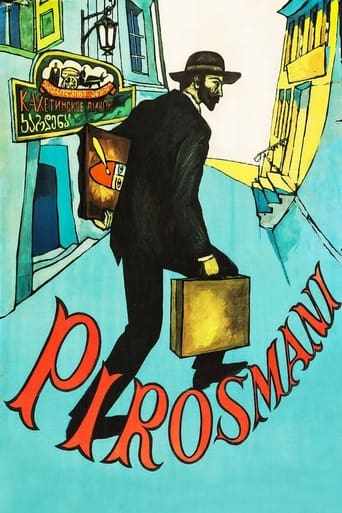Armand
at whole. for story of Pirosmani, one of the greatest Georgian art legends. for the impression of walk in a pinacotheque. for strange feeling about a classic story of an artist who tries remains himself against social pressure. a film about life. not different by many Georgian films of period but convincing thanks to a simple script and acting of Avtandil Varazi. the ash taste, melancholic slices, a lot of silence walls. and confession of a man for who existence is a form of fly, for who the freedom is essential value.far to be perfect, it seems be memorable. for the deep roots, for bitter images, for clear message, for the taste of honesty. a film who can remember basic things who lost their death.
Andres Salama
This little known film is quite strange yet well worth watching. Made in 1969, it tells the story of one Nico Pirosmanishvilli or Pirosmani, a primitive Georgian painter, not very well known in the west, who lived at the turn of the last century. The movie shows his paintings (I must admit I was not terribly impressed by them), his proud poverty, his antisocial behavior. A lot of the movie is shot in sparse, mildly surreal tableaux. When he sets up a shop with his brother, for example, it is not located in the city, but in the middle of a plain. There are some fine shots of the old, dilapidated quarters of Tbilissi, where Pirosmani lived since middle age, barely making ends meet by painting in taverns. I don't know if there is a Caucasian school of film-making, but this film suggests a saner, decaffeinated Paradjanov (who, as a matter of fact, did film a short about Pirosmani).
DialoGuy
I saw this movie when it played at the New Directors New Films series at the Museum of Modern Art in 1975. It was a wonderfully straightforward consideration of a very simple artist who, rather in the manner of Toulouse-Lautrec, hung out in bars and painted, literally, for his living, for food and drink. The film, I remember, had a style which diminished perspective rather as the artist did himself; I completely admired it, and frequently reflect on the sorry state of things that so fine a work can be just unavailable! I grew up in a world where memory of films was often the best one could hope for -- that world had the advantage of "revival theaters" where some old films might be viewed on a full-sized movie screen -- but now things are quite different and many many movies are available for owning or rental, but here is a clear example of a wonderful film -- sadly one of thousands -- still unavailable.
allenrogerj
A beautiful film: it depicts Pirosmani's life from early manhood in a series of scenes. Pirosmani- a famous primitive artist and Georgian hero- himself is played by Avtandil Varazi, an expert on the artist who acted as art adviser as well. He plays Pirosmani as becoming concerned almost entirely with his work, abandoning family and friends, moving away from humanity, uninterested in others- there are scenes where he is shown in inns, sitting alone, eating and drinking in exchange for a painting, uninterested in the people around him, turning down opportunities to be with them. The scenes which perhaps show his relationship with the public are one where he is locked in a room and told "You don't come out 'til we've got a painting.". The camera moves to outdoor celebrations- a strange set of scenes, including traditionally-dressed Georgians dancing a traditional dance to "modern" music on a horn gramophone, regardless of the music's relevance. "Oops" someone says "We've forgotten Piosmani." and we see him inside the door of the room, the painting, a view of Tiflis, completed. The other shows him taken up by the upper classes: one young painter is almost silent, just stares at the paintings and later brings him money for paint, but there is a scene of local dignitaries making speeches to which Pirosmani's response is just to ask for a wooden building where people can show pictures and talk. Later, when he is the victim of a caricature in the paper, he cannot understand the reason for it. Is there a Georgian school or style of film-making? Like Paradjanov, the greatest Georgian director, but not quite so strongly, there are deliberate, formal, pageant-like scenes and little concern for set-realism- Pirosmani's shop is shown in an empty landscape, rather than the city, for example, and the inns he works in are consciously shown as parts of a set. Scenes are deliberately staged theatrically, with the camera a fixed, distanced spectator. Perhaps the way Pirosmani painted is reflected in turn in the way the film is made. The cast- amateurs mostly- do not act the characters so much as "be" them in a Bresson-like way. A fine and unusual film about a fine artist in short.Update, March 2010: Watching all of Paradjanov's films- including a short about Pirosmani made many years after this film- I'm inclined to think that the resemblances may derive from Pirosmani's influence on Paradjanov.

